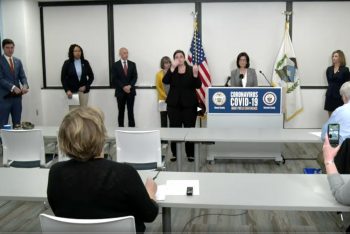By Mike McGann, Editor, The Times

Chester County and Delaware County officials announce an agreement for Chesco to prive health department services for Delco during the COVID-19 crisis.
COVID-19 has taken its first life in Pennsylvania, Gov. Tom Wolf said Wednesday — in Northampton County. Additionally, the state is reporting 185 cases, while Chester County is now reporting 10 cases within the county and announced an agreement with neighboring Delaware County to provide health services during the crisis.
With the big jump in cases in the state overnight, state officials stressed the seriousness of the pandemic.
“Our notable increase in cases over the last few days and our first death in Pennsylvania indicate we need everyone to take COVID-19 seriously,” Secretary of Health Dr. Rachel Levine said Thursday. “Pennsylvanians have a very important job right now: stay calm, stay home and stay safe. We have seen case counts continue to increase and the best way to prevent the spread of COVID-19 is to stay home.”
At a press conference Thursday, Chester County Commissioners announced that the county health department will also oversee health services in Delaware County, one of 57 counties statewide that does not have its own health department. Officials from both counties stressed that the agreement is only for the term of the ongoing COVID-19 crisis. Delaware County has been one of the early, hard-hit counties, now counting 14 cases as of Thursday morning.
Chester County officials stressed that the new agreement will not diminish services for Chester County residents.
Delco officials announced that there will be a number of drive-thru testing sites — in cooperation with various local hospitals. Tests will require a referral from a physician.
Elsewhere, state Sen. Andy Dinniman called for construction on the Mariner East II pipeline to be halted because of the crisis.
“We had valid concerns about this pipeline project before COVID-19. Those concerns are only heightened today,” Dinniman said. “If we are under a state of emergency with nonessential businesses and employees halting operations, how is this pipeline construction permitted to continue? Even PennDOT has halted construction on new projects, but this is allowed to go on?”
In a letter sent today to Pennsylvania Public Utility Commission Chair Gladys Brown, Dinniman made a strong case for halting construction of the controversial and problem-plagued pipeline project.
“While the majority of our constituents recognize the importance of their individual efforts collectively, we are profoundly perplexed and alarmed that pipeline construction is allowed to continue. Not only will direct interaction during construction place skilled laborers at unnecessary risk of infection, but also the movement of these individuals throughout our communities only furthers the risk to all, including our essential workforce of medical professionals and first responders,” he wrote.
As the economic impact of COVID-19 becomes more evident, Wolf moved Wednesday to request a disaster declaration to allow small business and non-profits to qualify for low-interest loans.
“The impact of financial losses related to COVID-19 will be felt for years to come,” said Gov. Wolf. “But these low-interest loans can help bridge the gap between economic losses now and economic recovery in the future.”
SBA’s Economic Injury Disaster Loans offer up to $2 million in assistance and can provide vital economic support to small businesses to help overcome the temporary loss of revenue they are experiencing. These loans may be used to pay fixed debts, payroll, accounts payable and other bills that can’t be paid because of the disaster’s impact.
The interest rate is 3.75% for small businesses without credit available elsewhere; businesses with credit available elsewhere are not eligible. The interest rate for non-profits is 2.75%.
When it comes to enforcing the ban on dine-in restaurants, the state means it and the Liquor Control Board is prepared to penalize eateries that do not comply.
Any licensee that fails to comply with this mandate now risks citation by the Pennsylvania State Police Bureau of Liquor Control Enforcement and suspension of operating authority by the PLCB. Any licensee that continues to operate after its license is suspended risks further enforcement action and closure by the BLCE. Ultimately, citations may put the business’s liquor license at risk, both through the citation process and upon application for renewal to the PLCB.
“Medical experts and public health professionals from around the world agree the best step we can take to slow the spread of COVID-19 is to stop gathering in public spaces,” said Board Chairman Tim Holden. “Extraordinary times require extraordinary measures, and this decision is not made lightly. But saving lives and protecting the health and safety of our communities is our highest priority right now.”






